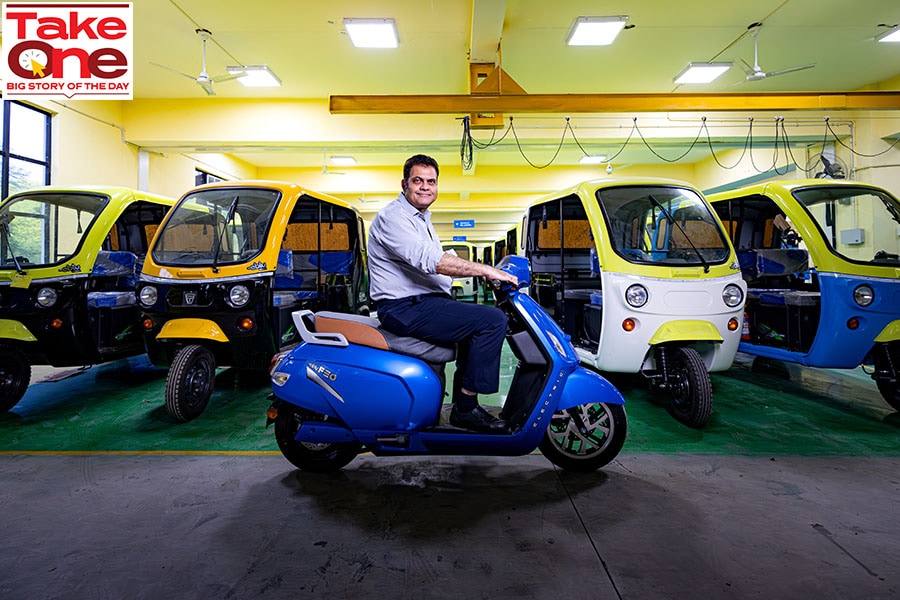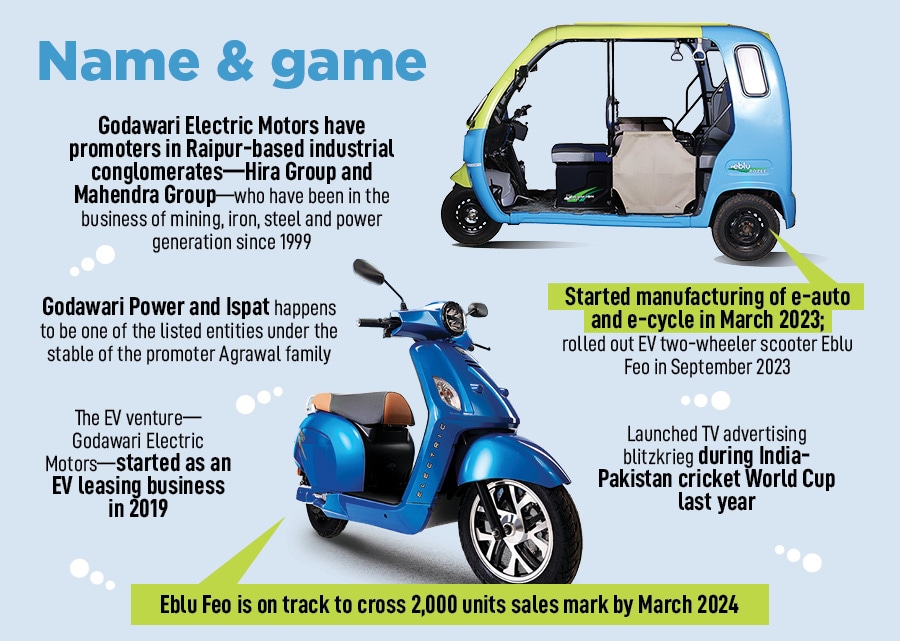
Meet the EV upstart from Chhattisgarh playing to enter the big boys' club
An EV upstart from Chhattisgarh is trying to break into the big boys' club by positioning electric two-wheelers as a 'family scooter'. Can the challenger brand Eblu give an electrifying fight to biggies like Ola, Ather, TVS and Bajaj as EVs enter an exciting phase in 2024?
 Mr Hyder Khan, CEO, Godawari Electric Motors
Image: Rachit Chimnani for Forbes India
Mr Hyder Khan, CEO, Godawari Electric Motors
Image: Rachit Chimnani for Forbes India
Raipur, Chhattisgarh. Hyder Khan was well aware of the flip side. The auto veteran—he spent close to 25 years across multiple companies such as Bajaj Auto, Piaggio, Mahindra Rise, Force Motors and Kinetic Green Energy—was heavily stacked against intimidating odds. The biggest one was that of an unknown brand. “Why should consumers trust a little-known brand either in electric vehicles (EVs) or internal combustion engine (ICE)?” was still the big unanswered question for Khan when he was in the midst of a hectic EV two-wheeler rollout for Godawari Electric Motors in September last year. “Don’t worry, there will be buyers,” was what he used to constantly remind himself and tell the sceptics who based their gloomy prediction on conventional wisdom of buyers staying away from lesser-known brands. “We were taking a huge leap of faith,” he recounts.
Back in 2019, Khan was taking a big punt on himself. All his life, the auto professional mastered his craft from Pune and Mumbai. Now, in 2019, he got an offer from Godawari Electric Motors in Chhattisgarh to relocate to Raipur and take care of the EV vertical. The maths didn’t make sense for two reasons. First, the promoters of Godawari Electric Motors were a Raipur-based industrial conglomerate who had been in the business of mining, iron, steel and power generation since 1999. The clout of the promoters, who have Godawari Power and Ispat as one of the listed entities in their stable, was comforting but the fact that the industrial house didn’t have any track record in auto operations and manufacturing was a red herring.
Second, the initial idea of Godawari Electric was not to make vehicles but to roll out an EV leasing business model which included buying EV three-wheelers, leasing it out on daily rent and creating self-employment opportunities. After a few months of success—the three-wheelers could be spotted in Delhi-NCR, Uttar Pradesh, Chhattisgarh and Madhya Pradesh—the pandemic disrupted the business model, and the leasing business was shuttered. Now in 2023, Godawari decided to take a plunge in the business of manufacturing EVs by rolling out the mother brand Eblu. It started with e-auto and e-cycle in March, and in September was getting ready to roll out EV two-wheeler scooter Feo.

The task was not easy. Godawari was making a switch from e-rickshaws to a full-stack EV player by rolling out scooters and had plans to get into e-loaders as well. The two-wheeler part, though, was the trickiest one. Five things compounded the problem. First, there was an unknown brand in Eblu. Second, Godawari was one of the last movers in the cluttered EV space, which already had Ola taking pole position, followed closely by TVS, Ather and Bajaj. Then there were others at the bottom rung of the pecking order such as Okinawa, Okaya, Kinetic Green, and Greaves. Third, Eblu was not playing a price war. With scooters carrying a price tag of Rs 1 lakh—Rs 99,999 to be precise—the upstart and the challenger brand was in no mood to play to the gallery. Fourth, constricted EV financing options were a big impediment in EV ownership. And lastly, it was tough to make auto dealers see value in retailing EVs. “We were one of the last ones to get into the game,” says Khan, who roped in top guns from the auto industry, beefed up the R&D department and set up a manufacturing facility that was spread over 1 lakh sq ft in Raipur.










